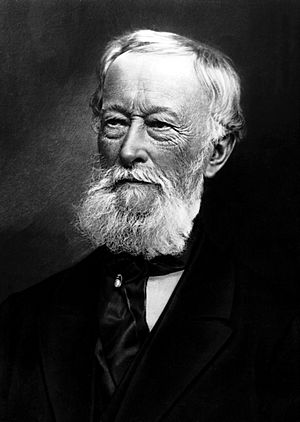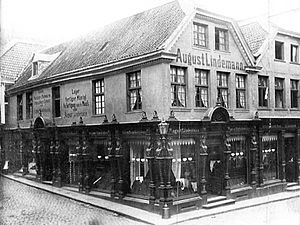Alfred Krupp facts for kids
Alfred Krupp (born Alfried Felix Alwyn Krupp; Essen, 26 April 1812 – Essen, 14 July 1887) was a famous German inventor and businessman. He made steel and was known as "The Cannon King" because his company supplied many weapons during his time.
Alfred Krupp's Life Story
Early Life and Taking Over the Business
Alfred Krupp was born in 1812 in Essen, Germany. His father, Friedrich Krupp, started a factory in 1811. However, his father struggled to make the factory successful. When Alfred was only 14 years old, his father passed away in 1826.
Alfred inherited his father's secret for making high-quality cast steel. He also took over a small workshop that was barely working. At this time, the family was in debt. Alfred left school to manage the company, even though his mother officially owned it.
Growing the Steel Business
By 1830, things started to improve. The growth of railways in Germany and Europe created a huge demand for steel. Steel was needed for train tracks and parts for steam locomotives. In August 1830, Krupp successfully supplied cast steel parts for the first time.
The creation of the German Customs Union made it easier to transport goods across Germany. This helped Krupp's business grow even more. By 1836, Krupp's company had 60 employees.
Caring for His Workers
Alfred Krupp cared deeply for his employees, who were later called "Kruppians." He introduced health insurance to help them when they were sick. He also built apartments for his workers and their families. In return, he expected them to be loyal to his company.
Innovations and World Recognition
Alfred Krupp worked hard to find new customers and get the raw materials he needed. He also found ways to pay for his factory's expansion. In 1851, he showed off the largest steel block ever made at the Great Exhibition in London. It weighed 4,300 pounds (about 1,950 kg).
Another important invention in 1851 was railway tires made without welds. These tires became a major source of income for the company, especially from sales to railways in the United States.
The Cannon King
Alfred Krupp made his factory bigger and worked on a long-held dream. He wanted to build a breech-loading cannon made of cast steel. Breech-loading cannons were loaded from the back, making them more accurate and faster to fire. However, many military officers preferred older, muzzle-loaded bronze cannons.
At first, Krupp couldn't sell his steel cannons. He even gave one to the King of Prussia as a decoration. But the king's brother, Wilhelm, saw how important this invention was. When Wilhelm became regent in 1859, Prussia bought its first 312 steel cannons from Krupp. This made Krupp the main weapon supplier for the Prussian military.
Krupp's Role in Wars
Prussia used Krupp's advanced cannons to win wars against Austria and France. The Franco-Prussian war was partly a battle between Krupp's steel cannons and older bronze cannons. Germany's success with these cannons led to an international arms race. Other countries like France (with Schneider-Creusot) and England (with Armstrong) started making their own advanced weapons.
Krupp sold improved artillery and strong steel armor to many countries, from Russia to Chile.
Business Challenges and Growth
During a financial crisis in 1873, Alfred Krupp continued to expand his company. He bought mines in Spain and shipping companies in the Netherlands. This made Krupp the largest and richest company in Europe. However, it almost caused the company to go bankrupt. The Prussian State Bank helped him out with a large loan.
In 1878 and 1879, Krupp held special events called Völkerschiessen. These were firing demonstrations of his cannons for buyers from different countries. They took place at his private testing ground in Meppen, which was the largest in the world. Krupp ended up selling cannons to 46 nations.
By the time Alfred Krupp died in 1887, his company had 75,000 employees. He had manufactured a total of 24,576 guns. About 10,666 were for the German government, and 13,910 were sold to other countries.
Krupp's Company Rules and Worker Care
Krupp created a set of rules for his company called the Generalregulativ. The company was owned by one person and passed down to the oldest son. Krupp had strict control over his workers. He asked them to promise loyalty to the company.
In return, Krupp offered many social services that were very advanced for his time.
Worker Housing and Benefits
- Housing: Around 1861, Krupp started building houses for his employees because there weren't enough homes in the town. By 1862, houses were ready for foremen, and in 1863, the first houses for workers were built. By 1905, 400 houses were provided, and some were given rent-free to widows of former workers.
- Cooperative Store: In 1868, a cooperative store was started. Workers could buy goods there, and the profits were shared based on how much they bought.
- Boarding House: A boarding house for single men, called the Ménage, opened in 1865 with 200 residents. By 1905, it could house 1,000 men.
- Health and Safety: Bathhouses were provided, and employees received free medical services. Accident, life, and sickness insurance programs were created, and the company helped support them.
- Education: Technical and manual training schools were also provided for workers.
Essen became a large "company town" because so many people worked for Krupp. The workers, known as "Kruppianer," were very loyal to the company and the Krupp family.
Support from the Kaiser
Alfred Krupp was highly respected by the Kaiser (the German Emperor). The Kaiser even fired two War Ministers for not agreeing with Krupp's design for a new field gun. He famously said, "I’ve canned three War Ministers because of Krupp, and still they don’t catch on!"
Family Life
Alfred Krupp's marriage was not very happy. His wife, Bertha, did not like living in polluted Essen at Villa Hügel, the large mansion Krupp designed. She spent most of their married life at resorts and spas with their only child, a son.
Alfred Krupp's Personality
Alfred Krupp was a unique person. He was a very hard worker who never stopped trying to improve. However, he also suffered from depression and sometimes stayed in bed for weeks or months.
He believed that an employer should be like a father figure to his workers. He expected them to be obedient and respectful. In return, he would provide them with a secure life. He was very proud of being an entrepreneur.
Leaders from all over Europe visited him at his home, Villa Hügel. Kings and emperors came to see him not for parties, but as customers. Because of this, in 1865, he turned down a noble title offered by the King of Prussia. He felt it was "inappropriate to his wishes." He believed his name, Krupp, was enough.
See also
 In Spanish: Alfred Krupp para niños
In Spanish: Alfred Krupp para niños
 | DeHart Hubbard |
 | Wilma Rudolph |
 | Jesse Owens |
 | Jackie Joyner-Kersee |
 | Major Taylor |



